Программное обеспечение для планирования проектов имеет решающее значение для обеспечения эффективности проекта и своевременной доставки за счет управления задачами, сроками и распределением ресурсов. В этой статье представлены лучшие инструменты планирования для управления проектами, доступные в 2026 году, предлагающие обзор их ключевых функций, преимуществ и затрат. Эти инструменты помогают командам оптимизировать рабочие процессы и оставаться на правильном пути.
Что такое программное обеспечение для планирования проектов?
Программное обеспечение для планирования проектов предназначено для помощи командам в планировании, управлении и выполнении проектов с большей эффективностью. Предоставляя такие важные функции, как корректировка сроков, распределение ресурсов и отслеживание зависимостей, эти инструменты помогают менеджерам поддерживать организацию и гарантировать, что задачи выполняются в срок. Отслеживание в реальном времени позволяет менеджерам контролировать процесс, выявлять узкие места и вносить коррективы по мере необходимости, обеспечивая своевременное выполнение всех задач.
Кроме того, программное обеспечение для управления проектами и планированием часто интегрируется с другими системами управления задачами проекта, предоставляя всеобъемлющее решение для команд, работающих с сложными рабочими процессами. Такие функции, как совместная работа в реальном времени, автоматическое обновление задач и отслеживание ключевых этапов, позволяют командам работать более слаженно, сокращать задержки и оптимизировать использование ресурсов. Это приводит к улучшению результатов, лучшему взаимодействию между заинтересованными сторонами и большей прозрачности в отслеживании прогресса. Программное обеспечение также позволяет командам оптимизировать свои рабочие процессы, что приводит к повышению производительности и более эффективному использованию времени и ресурсов.
Преимущества программного обеспечения для планирования проектов
Программное обеспечение для планирования проектов предлагает значительные преимущества, которые помогают командам оптимизировать свои рабочие процессы и улучшать результаты. Улучшенная видимость проекта является одним из ключевых преимуществ, поскольку команды получают четкий обзор задач, сроков и доступных ресурсов в реальном времени. Эта видимость позволяет принимать более обоснованные решения и дает менеджерам возможность вносить своевременные коррективы для обеспечения гладкого выполнения. Улучшенное управление ресурсами — другое ключевое преимущество. Программное обеспечение позволяет эффективно распределять ресурсы, обеспечивая, чтобы сотрудники не были перегружены, а задачи выполнялись в срок. Такой сбалансированный подход помогает поддерживать производительность и моральный дух команды.
Эти приложения для управления задачами проекта также поддерживают лучшую оценку рисков путем выявления потенциальных рисков и узких мест до того, как они станут критическими, что позволяет командам внедрять проактивные решения. Это минимизирует сбои и позволяет проекту оставаться на правильном пути. Кроме того, точная установка сроков обеспечивается благодаря точной корректировке сроков и отслеживанию прогресса. Команды могут устанавливать реалистичные сроки на основе сложности проекта и доступных ресурсов. Эти преимущества в совокупности оптимизируют результаты, уменьшают задержки и повышают удовлетворенность клиентов, гарантируя, что проекты завершаются в срок и в пределах бюджета.
Как выбрать правильное программное обеспечение для планирования проектов
Вот несколько советов по выбору правильного программного обеспечения для планирования проектов:
- Проверьте возможности интеграции: Важно, чтобы программное обеспечение бесшовно интегрировалось с вашими существующими инструментами, такими как CRM, платформы для общения и т.д. Интеграция помогает оптимизировать рабочие процессы, сокращая необходимость переключения между несколькими инструментами и позволяя более гладкое управление задачами проекта между командами.
- Ставьте во главу угла простоту использования: Программное обеспечение должно иметь интуитивно понятный интерфейс, который минимизирует кривую обучения. Это поможет вашей команде быстрее принять программное обеспечение и начать эффективно его использовать без обширного обучения. Простой в навигации инструмент также гарантирует, что команда может сосредоточиться на задачах, а не тратить время на изучение платформы.
- Учтите масштабируемость: По мере роста вашего бизнеса и проектов программное обеспечение должно иметь возможность поддерживать больше пользователей, ресурсов и задач, не замедляя работу. Масштабируемое программное обеспечение для планирования проектов гарантирует, что вам не придется переходить на новую платформу по мере расширения вашей компании, что сэкономит вам время и деньги в долгосрочной перспективе.
- Ищите поддержку методологии: Разные команды следуют разным методологиям управления проектами, таким как Agile, Waterfall или Kanban. Убедитесь, что программное обеспечение для управления задачами проекта достаточно гибко, чтобы поддерживать вашу предпочтительную методологию, позволяя вашей команде сохранять свой подход к проекту, получая преимущества от современных инструментов планирования.
Лучшее программное обеспечение для планирования проектов в 2026 году
Чтобы сделать ваше исследование проще, мы подготовили список лучших программ для планирования проектов с таблицей сравнения для быстрого обзора:
Название программного обеспечения | Ключевые функции | Для кого лучше всего | Цены |
Worksection | Управление задачами, список дел, отслеживание времени, диаграмма Ганта, Канбан, календарь, отчетность, календарь, контроль доступа. | Малые и средние команды | От $3.4/пользователь/месяц |
Monday.com | Кастомизация рабочих процессов, отслеживание времени, автоматизация | Растущие бизнесы | От $9/пользователь/месяц |
Asana | Отслеживание задач, сроки, совместная работа | Команды, нуждающиеся в надежных инструментах управления | От $10.99/пользователь/месяц |
Trello | Доски Канбан, управление задачами | Малые команды и стартапы | От $5/пользователь/месяц |
Wrike | Продвинутое управление задачами, диаграмма Ганта, отчетность | Сложное управление проектами | От $9.80/пользователь/месяц |
ClickUp | Пользовательские виды, автоматизация задач, отслеживание целей | Команды, нуждающиеся в настройке | От $7/пользователь/месяц |
Smartsheet | Интерфейс на основе сетки, отслеживание ресурсов, отчетность | Большие команды, управляющие детализированными проектами | От $9/пользователь/месяц |
Basecamp | Списки задач, обмен файлами, инструменты общения | Малые команды, нуждающиеся в простоте | От $15/пользователь/месяц |
Todoist | Списки дел, приоритизация задач | Фрилансеры и малые команды | От $4/пользователь/месяц |
Microsoft Project | Детализированное планирование, управление ресурсами | Команды, знакомые с продуктами Microsoft | От $10/пользователь/месяц |
Worksection
Worksection — это программное обеспечение для планирования проектов, которое особенно полезно для малых и средних команд. Оно предлагает такие функции, как диаграмма Ганта, доски Канбан и отслеживание времени, что позволяет эффективно управлять задачами, сроками и ресурсами. Программное обеспечение способствует сотрудничеству через встроенные инструменты общения с клиентами, помогая оставаться на одной волне. Worksection пользуются доверием более 1600 компаний из различных секторов, начиная от маркетинга и заканчивая IT и консалтингом.
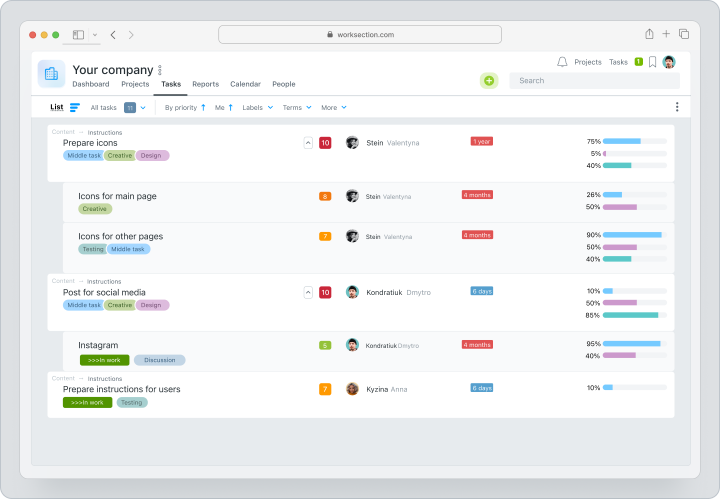
Его удобный интерфейс и доступные цены, начинающиеся с $3.4 за пользователя в месяц, делают Worksection бюджетным выбором для организаций, стремящихся повысить свою эффективность.
Monday.com
Monday.com является высоко адаптируемой платформой, предназначенной для бизнеса любого размера с такими функциями, как автоматизация рабочих процессов, отслеживание времени и настраиваемые рабочие процессы. Его гибкость позволяет командам создавать персонализированные системы, которые развиваются вместе с требованиями проектов, что делает его идеальным для растущих компаний. Бесшовная интеграция с другими инструментами, такими как Google Workspace и Slack, улучшает совместную работу и упрощает управление проектами. Визуальный, удобный интерфейс платформы помогает командам оставаться организованными и отслеживать прогресс в реальном времени.
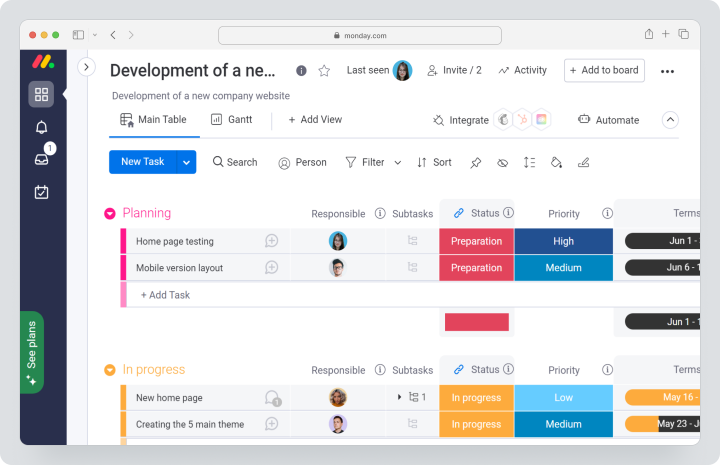
Низкая стоимость и масштабируемость Monday.com, начиная с $9 за пользователя в месяц, делают его популярным выбором для команд, управляющих динамичными проектами.
Asana
Asana выделяется в управлении задачами проекта, сроками и командной совместной работой, что делает ее универсальным инструментом управления проектами для компаний любого размера. Его интуитивный дизайн упрощает отслеживание прогресса, назначение задач и установку сроков, обеспечивая согласованность команд. Интеграция с популярными инструментами, такими как Slack, Google Drive и Microsoft Teams, делает сотрудничество плавным и эффективным. Asana особенно эффективна для управления сложными рабочими процессами, позволяя командам визуализировать свой прогресс через сроки и отчеты.
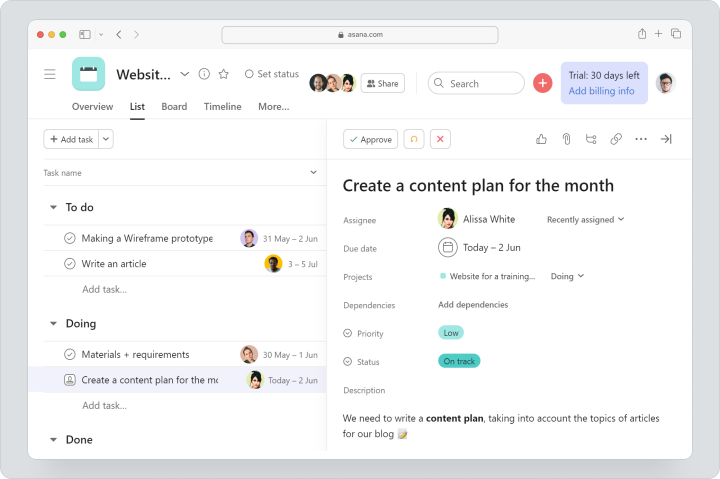
Цены начинаются с $10.99 за пользователя в месяц, предлагая надежное решение для команд, стремящихся получить всестороннее программное обеспечение для планирования проектов.
Trello
Trello известен своей простой, но эффективной системой Канбан, которая позволяет пользователям визуально управлять задачами. Это делает его отличным вариантом для стартапов, фрилансеров и малых команд, ищущих простой в использовании инструмент для отслеживания проектов. Интерфейс Drag-and-Drop Trello быстро осваивается и требует минимального обучения. Пользователи могут настраивать задачи, добавляя вложения, метки, сроки и контрольные списки, что позволяет достигать высокой степени персонализации.
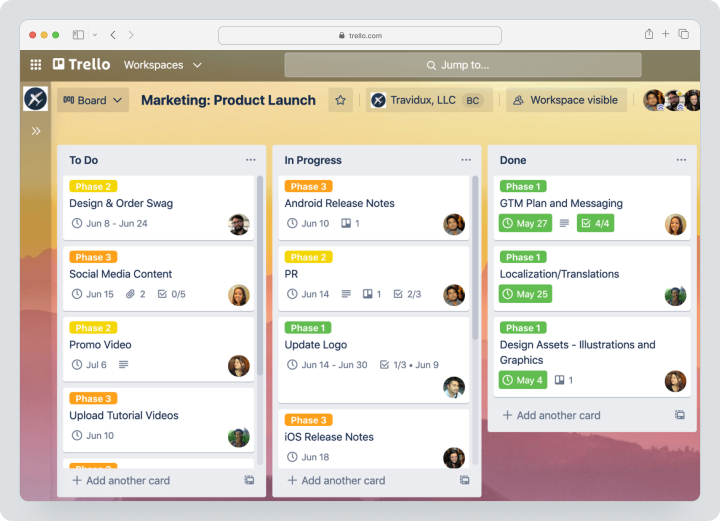
Цены на Trello начинаются с $5 за пользователя в месяц и включают продвинутые функции, такие как автоматизация и интеграции.
Wrike
Wrike является комплексным инструментом управления задачами проекта, ориентированным на команды, работающие с комплексными проектами и множеством заинтересованных сторон. Он предлагает продвинутые функции, такие как диаграммы Ганта, отслеживание ресурсов и углубленные инструменты отчетности, позволяя осуществлять сотрудничество и управление задачами в реальном времени. Wrike плавно интегрируется с другими бизнес-инструментами, включая Google Workspace, Microsoft Teams и Salesforce, что делает его идеальным для распределенных команд. Его гибкие функции обеспечивают возможность эффективного управления даже сложными рабочими процессами.
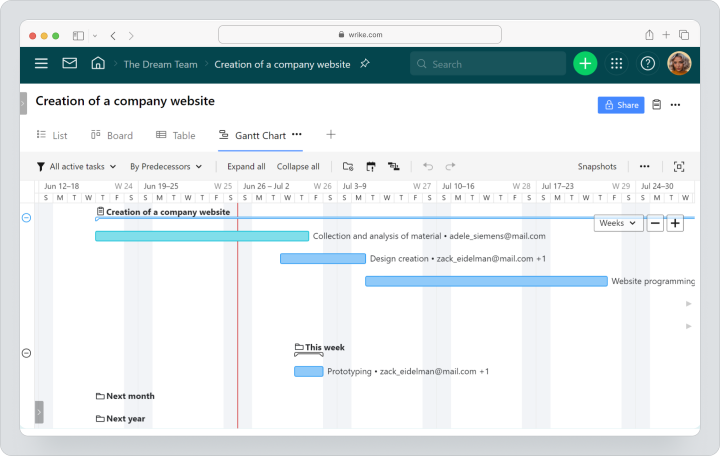
Цены на Wrike начинаются с $9.80 за пользователя в месяц, предлагая отличное соотношение цены и качества для команд, нуждающихся в детальном управлении задачами проекта.
ClickUp
ClickUp выделяется своими настраиваемыми функциями управления задачами, что делает его универсальным решением для команд, требующих усовершенствованных рабочих процессов. Он предлагает широкий спектр возможностей, таких как автоматизация задач, индивидуальные виды и отслеживание целей, адаптированных к специфическим потребностям. С опциями управления задачами в различных форматах, включая списки, доски и календари, ClickUp предоставляет гибкость для команд любого размера. Его интеграция с популярными инструментами, такими как Slack, Google Drive и Zoom, дополнительно повышает его полезность.
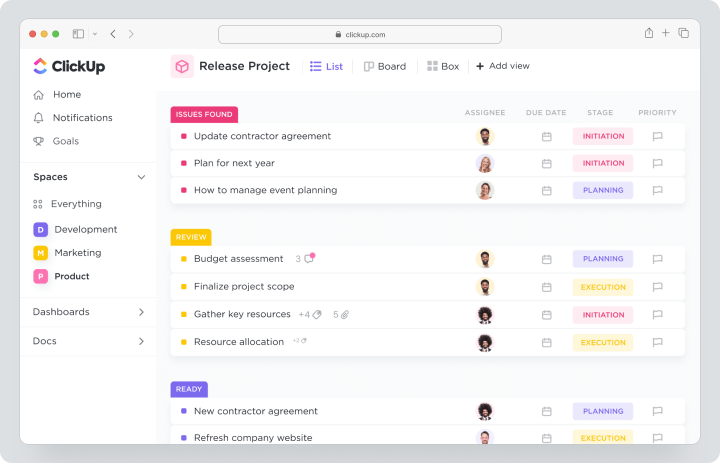
Цены начинаются с $7 за пользователя в месяц, что делает ClickUp мощным и доступным программным обеспечением для планирования проектов.
Smartsheet
Smartsheet сочетает в себе простоту таблицы с мощными функциями управления задачами проектами, такими как отслеживание ресурсов, отчетность и сотрудничество в реальном времени. Идеален для больших команд, управляющих несколькими сложными проектами, интерфейс Smartsheet на основе сетки позволяет командам эффективно организовывать данные. Функции автоматизации платформы упрощают выполнение повторяющихся задач, а интеграция с инструментами, такими как Microsoft Office, Google Workspace и Salesforce, гарантирует синхронизацию всех данных между системами.
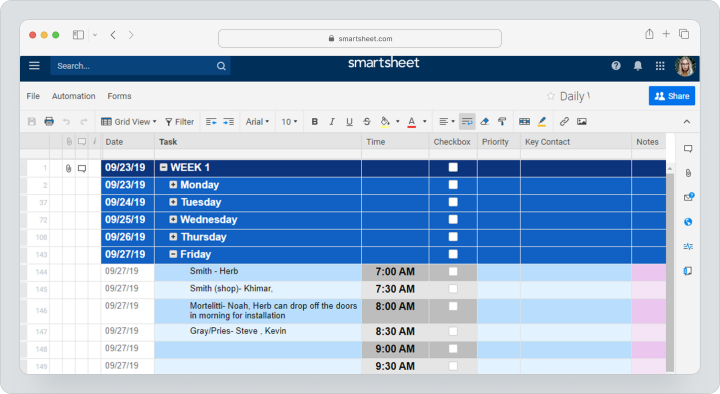
Гибкость Smartsheet делает его лучшим выбором для команд, работающих над проектами, с ценами, начиная с $9 за пользователя в месяц.
Basecamp
Basecamp разработан для малых команд, которым нужно простое и эффективное управление проектами без сложностей больших систем. Он предоставляет основные функции управления задачами проекта, такие как списки задач, обмен файлами и коммуникация в команде, все в удобном интерфейсе. Basecamp особенно популярен среди стартапов и малых компаний. Организованный макет платформы обеспечивает простое сотрудничество и четкую коммуникацию по всем проектам.
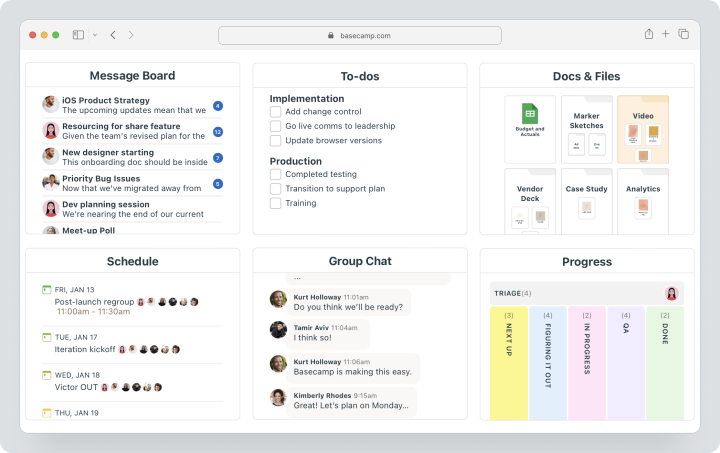
Цены начинаются с $15 за пользователя в месяц, что делает его хорошим вариантом для команд, нуждающихся в простом инструменте управления проектами.
Todoist
Todoist — популярное приложение для списков дел, известное своей простотой и эффективностью в управлении задачами проекта. Оно позволяет пользователям организовывать проекты, приоритизировать задачи и устанавливать сроки, что делает его идеальным для личного управления задачами или для фрилансеров. Удобный интерфейс Todoist гарантирует, что даже менее опытные пользователи смогут эффективно управлять своими задачами и контролировать свои ежедневные обязанности.
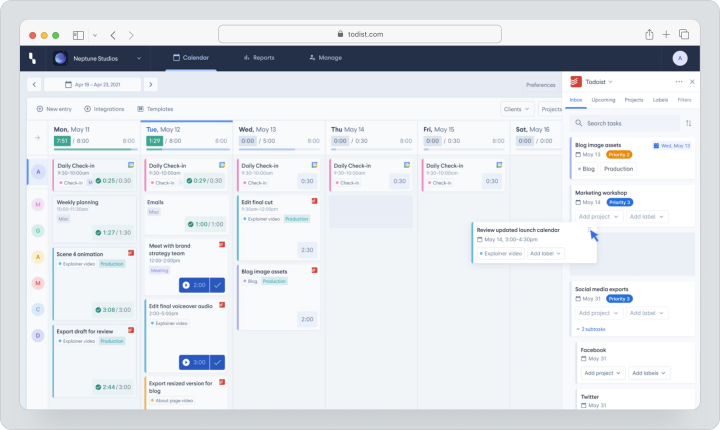
Платные тарифы начинаются с $4 за пользователя в месяц и включают такие продвинутые функции, как напоминания о задачах, шаблоны и отслеживание продуктивности.
Microsoft Project
Microsoft Project является мощным программным обеспечением для планирования проектов, нацеленным на команды, уже знакомые с экосистемой Microsoft. Оно предлагает детализированное планирование, диаграммы Ганта и функции управления ресурсами, чтобы помочь командам отслеживать прогресс и соблюдать сроки. Microsoft Project плавно интегрируется с другими инструментами Microsoft, такими как Excel и SharePoint, что делает его комплексным решением для крупных организаций, управляющих сложными рабочими процессами.
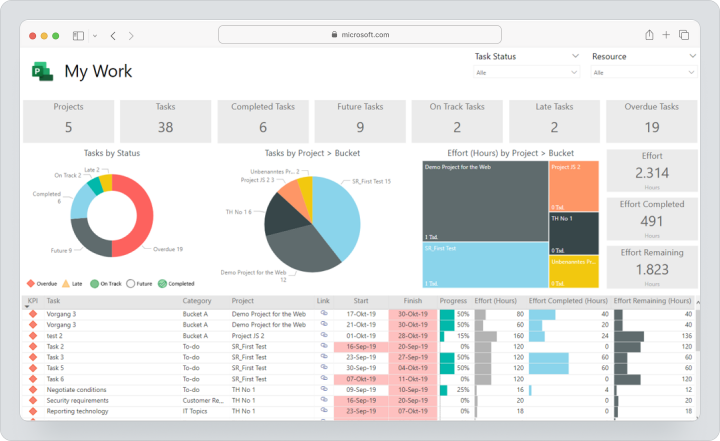
С ценами, начиная с $10 за пользователя в месяц, Microsoft Project предлагает обширные функциональные возможности для бизнеса, нуждающегося в детальном управлении задачами проекта и отслеживании ресурсов.
Кто должен использовать программное обеспечение для планирования проектов?
Программное обеспечение для планирования проектов крайне полезно для широкого круга отраслей, помогая командам оставаться организованными, соблюдать сроки и эффективно управлять ресурсами.
- Строительные компании полагаются на программное обеспечение для планирования проектов для управления крупномасштабными проектами, которые включают множество задач и зависимостей, такие как координация подрядчиков, управление сроками и обеспечение того, чтобы все фазы строительства были завершены вовремя.
- ИТ-проектные команды используют программное обеспечение для планирования, чтобы отслеживать циклы разработки, управлять фазами тестирования и гарантировать, что релизы программного обеспечения соответствуют срокам. Эти инструменты помогают выравнивать задачи разработки с целями и более эффективно управлять распределением ресурсов.
- Организаторы мероприятий получают выгоду от инструментов планирования, координируя множество поставщиков, отслеживая сроки и управляя сложной логистикой мероприятий. От бронирования помещений до координации кейтеринга, эти инструменты упрощают процесс планирования и помогают обеспечить успешные мероприятия.
- Архитекторы, юристы и маркетинговые агентства также используют эти инструменты для управления результатами проектов, сроками и совместной работой команды. Любая организация, которая справляется со сложными проектами с множеством заинтересованных сторон, может использовать программное обеспечение для планирования проектов, чтобы повысить производительность, сократить задержки и улучшить общие результаты.
Интеграция программного обеспечения для планирования проектов с другими бизнес-инструментами
Интеграция программного обеспечения для планирования проектов с другими бизнес-инструментами имеет решающее значение для повышения общей производительности и упрощения рабочих процессов между отделами. Соединяя инструменты планирования с CRM-системами, команды могут лучше управлять взаимодействием с клиентами, отслеживать прогресс и гарантировать, что сроки соответствуют ожиданиям клиентов. Интеграция с финансовым программным обеспечением позволяет точно отслеживать бюджет и распределение ресурсов, гарантируя, что проекты остаются в рамках бюджета, а финансовые данные обновляются в реальном времени. Кроме того, соединение инструментов планирования с платформами для общения, такими как Slack или Microsoft Teams, обеспечивает бесшовное сотрудничество между членами команды, позволяя получать обновления в реальном времени и минимизируя недопонимание.
Интеграция с инструментами для обмена файлами, такими как Google Drive или Dropbox, дополнительно повышает эффективность рабочих процессов, позволяя членам команды получать доступ к важным документам и файлам непосредственно в программном обеспечении для планирования. Это устраняет необходимость переключаться между несколькими платформами, экономя время и снижая количество ошибок. Возможность централизовать все данные, связанные с проектом, повышает прозрачность и позволяет всем заинтересованным сторонам оставаться на одной волне, что способствует более гладкому выполнению и своевременному завершению.
Кейсы: Успешные реализации
Строительная компания внедрила программное обеспечение для планирования проектов, чтобы одновременно управлять несколькими крупномасштабными проектами. Инструмент позволил компании централизовать свои графики, ресурсы и сроки, что привело к сокращению задержек на 20%. Это улучшило координацию между строительными командами, подрядчиками и поставщиками, обеспечивая более эффективное использование ресурсов и постоянное соблюдение сроков. Функция отслеживания в реальном времени также позволила менеджерам быстро выявлять узкие места и корректировать ресурсы соответственно, что еще больше улучшило результаты.
В маркетинговом секторе Marketing Office использовал Worksection для улучшения рабочих процессов и управления клиентами. Используя программное обеспечение для планирования проектов и функции назначения задач, агентство смогло повысить производительность и оптимизировать распределение ресурсов. С улучшенной прозрачностью и коммуникацией Marketing Office наблюдал увеличение удовлетворенности клиентов благодаря более быстрым срокам реагирования и более эффективной доставке проектов.
Эти примеры подчеркивают преобразующий эффект, который программное обеспечение для планирования проектов может оказать на широкий спектр отраслей.
Часто задаваемые вопросы
Можно ли использовать программное обеспечение для планирования проектов для небольших проектов?
Да, программное обеспечение для планирования проектов имеет масштабируемость и адаптируемость для малых команд или отдельных пользователей. Даже для меньших проектов эти инструменты предлагают основные функции, такие как отслеживание задач, планирование и совместная работа.
Каковы типичные расходы на внедрение программного обеспечения для планирования проектов?
Стоимость программного обеспечения для планирования проектов варьируется в зависимости от платформы и функций. Планы платформ могут варьироваться от $3.4 до $15 и более за пользователя в месяц. Разнообразие цен обеспечивает возможность для бизнеса любого размера найти решение, которое соответствует их потребностям и бюджету.